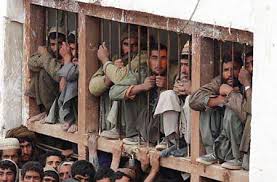 A British court said Friday that suspected Taliban captives face the risk of mistreatment in a Kabul jail, but rejected an attempt to ban British troops from handing them over to Afghan security forces.
A British court said Friday that suspected Taliban captives face the risk of mistreatment in a Kabul jail, but rejected an attempt to ban British troops from handing them over to Afghan security forces.Anti-war activist Maya Evans asked the High Court to forbid British troops from transferring detainees to Afghanistan's National Directorate for Security. Her lawyers said prisoners had suffered abuse including beatings, electrocution and sleep deprivation.

 Human Rights Glance
Human Rights Glance The Helou family is so worried about getting expelled to Gaza by Israeli authorities that they're all but trapped in this West Bank town. They couldn't even leave to get their disabled son the best possible surgery to let him walk.
The Helou family is so worried about getting expelled to Gaza by Israeli authorities that they're all but trapped in this West Bank town. They couldn't even leave to get their disabled son the best possible surgery to let him walk. A lawyer representing the City of Brotherly Love, David Smith, told the federal jury that the local scout leaders were "speaking out of both sides of their mouths" when they initially agreed with the city's anti-discrimination policy but then continued to use the national group's employment application, which stated that homosexuals, atheists, and agnostics would not be hired.
A lawyer representing the City of Brotherly Love, David Smith, told the federal jury that the local scout leaders were "speaking out of both sides of their mouths" when they initially agreed with the city's anti-discrimination policy but then continued to use the national group's employment application, which stated that homosexuals, atheists, and agnostics would not be hired. Ethan McCord, one of the soldiers seen in the now-famous Wikileaks video in which two American Apache helicopters fire upon a relaxed, unhurried gaggle of men in Baghdad, has stated in an interview with World Socialist Website that he witnessed numerous times the indiscriminate slaughter of civilians in Iraq after IED attacks. McCord is on of the soldiers seen helping two wounded children after the attack. He has stepped forward with open opposition to the wars in Iraq and Afghanistan, and written a letter of apology for his part in the incident to the mother of the children, who has accepted his apology. The mother's husband was killed in the attack and found with his body shielding that of one of his children.
Ethan McCord, one of the soldiers seen in the now-famous Wikileaks video in which two American Apache helicopters fire upon a relaxed, unhurried gaggle of men in Baghdad, has stated in an interview with World Socialist Website that he witnessed numerous times the indiscriminate slaughter of civilians in Iraq after IED attacks. McCord is on of the soldiers seen helping two wounded children after the attack. He has stepped forward with open opposition to the wars in Iraq and Afghanistan, and written a letter of apology for his part in the incident to the mother of the children, who has accepted his apology. The mother's husband was killed in the attack and found with his body shielding that of one of his children. The Obama administration is considering partially lifting its suspension of all transfers of Guantanamo Bay detainees to Yemen, officials said, following a federal court ruling that found "overwhelming" evidence to support a Yemeni's claim that he has been unlawfully detained by the United States for more than eight years.
The Obama administration is considering partially lifting its suspension of all transfers of Guantanamo Bay detainees to Yemen, officials said, following a federal court ruling that found "overwhelming" evidence to support a Yemeni's claim that he has been unlawfully detained by the United States for more than eight years. The Prime Minister's Office announced on Thursday that the security cabinet had agreed to relax Israel's blockade on the Gaza Strip, but as it turns out, no binding decision was ever made during the cabinet meeting.
The Prime Minister's Office announced on Thursday that the security cabinet had agreed to relax Israel's blockade on the Gaza Strip, but as it turns out, no binding decision was ever made during the cabinet meeting. For the first time in the war stricken story of mankind, waging aggressive wars has become a prosecutable crime in international law and given precise meaning and teeth before the ICC - this on the strength of an unexpected consensus reached between member states of the Court (or in ICC terminology 'states parties').
For the first time in the war stricken story of mankind, waging aggressive wars has become a prosecutable crime in international law and given precise meaning and teeth before the ICC - this on the strength of an unexpected consensus reached between member states of the Court (or in ICC terminology 'states parties').






























